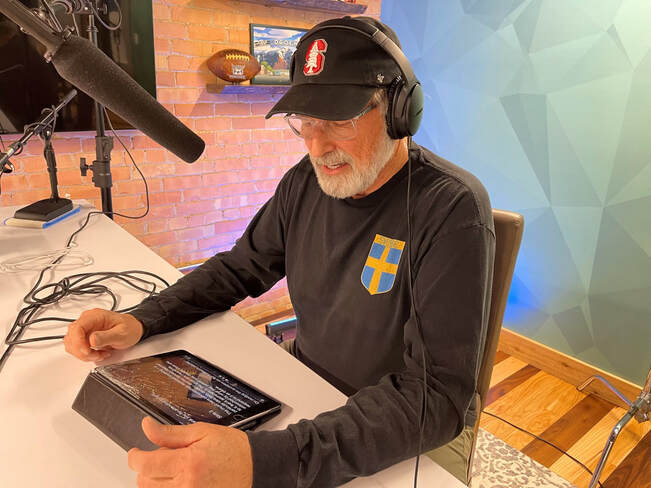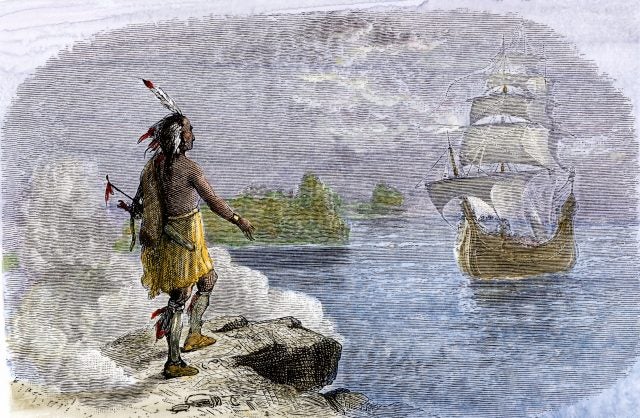|
No...Thanksgiving is not about Genocide or Violence... The Pilgrims struggling to survive at Plymouth Plantation learned the importance of private property first-hand in 1623 when Governor Bradford adopted a free-enterprise system after just two years of communal sharing. Their experiment with socialism revealed valuable lessons that inspired the colony to shift to a free-market economic system that would serve as the foundation upon which America would grow into a great and prosperous nation. As the Pilgrims learned, societies that respect property and the rule of law capture the benefits of free-market enterprise and enjoy high levels of prosperity. The benefit that we see from free markets is contingent on individuals having the right to own and protect property and to benefit from their labor. “The settlers now began to consider corn more precious than silver” – Governor William Bradford Plymouth Plantation was an experiment. Disgruntled members of the Old World left behind oppressive governments in search of a New World – both in terms of land as well as social, political and economic systems. The Pilgrims arrived at what would become the Plymouth Plantation in the late fall of 1620 and immediately implemented a communal labor system for the colony... Governor Bradford, along with other leaders, believed that this system was the most efficient and fair distribution of resources. Each member of the colony would farm a plot of land and give all of his harvest to the common storehouse where it would then be redistributed as needed.
But this strategy was a disaster, resulting in food shortages and widespread hunger. In fact, just 50 of the 102 original settlers survived past the first winter in 1620 due to hunger and disease. Because each member of the community received a set amount of grain regardless of what he produced—the system distorted the incentives for individuals to make the sacrifice of working for the material support of their fellow human beings. Hunger was pervasive as many members of the community shirked their duty and did not produce enough food for everyone, relying on others to provide the food that would then be divided equally. Furthermore, men resented the obligation to support other men’s families. As the situation worsened, stealing from the communal storehouse became widespread since the storehouse was not actually owned by anyone. Solution? Give them land! Recognizing the failure of the communal system, Governor Bradford implemented private property rights, giving individuals an incentive to produce as much food as possible. Each individual or family in the colony was given a plot of land to farm and was permitted to enjoy all the products of their labor. The results of allowing for individual production and trade as a foundation to economic freedom were staggering. Within two years, the colony was producing so much food that members began trading their surplus with other community members and with the nearby Wampanoag tribe, expanding access to different kinds of goods. With more food and comforts, the colony’s population grew and geographically expanded. The experience at Plymouth Plantation illustrates the significance of property rights for economic growth and prosperity. The Pilgrims taught us that human beings are motivated to work and produce when they are allowed to benefit from their labor. The United States grew to become one of the most prosperous nations in the world thanks, in part, to the lessons learned at the tiny Massachusetts colony in the early 17th century. The experience serves as a powerful reminder that economic freedom and the protection of property rights upon which it rests lead to flourishing and prosperous societies. (This originally appeared on EconomicFreedom.org, a project of the Charles Koch Institute,) With these lessons our country was founded…and has prospered…not because of government…but because our inalienable rights were to be recognized by government and not trampled upon. Following a resolution of Congress, President George Washington proclaimed Thursday the 26th of November 1789 a day of “public thanksgiving and prayer” devoted to “the service of that great and glorious Being who is the beneficent Author of all the good that was, that is, or that will be.” In setting aside, a day for Thanksgiving, Washington established a non-sectarian tone for these devotions and stressed political, moral, and intellectual blessings that make self-government possible, in addition to personal and national repentance. Transcending passionate quarrels over the proper role of religion in politics, the Thanksgiving Proclamation reminds us how natural their relationship has been. While church and state are separate, religion and politics, in their American refinement, prop each other up. Thanksgiving Proclamation Issued by President George Washington, at the request of Congress, on October 3, 1789 “Whereas it is the duty of all nations to acknowledge the providence of Almighty God, to obey His will, to be grateful for His benefits, and humbly to implore His protection and favor; and—Whereas both Houses of Congress have, by their joint committee, requested me “to recommend to the people of the United States a day of public thanksgiving and prayer, to be observed by acknowledging with grateful hearts the many and signal favors of Almighty God, especially by affording them an opportunity peaceably to establish a form of government for their safety and happiness:” “Now, therefore, I do recommend and assign Thursday, the 26th day of November next, to be devoted by the people of these States to the service of that great and glorious Being who is the beneficent author of all the good that was, that is, or that will be; that we may then all unite in rendering unto Him our sincere and humble thanks for His kind care and protection of the people of this country previous to their becoming a nation; for the signal and manifold mercies and the favor, able interpositions of His providence in the course and conclusion of the late war; for the great degree of tranquility, union, and plenty which we have since enjoyed; for the peaceable and rational manner in which we have been enabled to establish constitutions of government for our safety and happiness, and particularly the national one now lately instituted; for the civil and religious liberty with which we are blessed, and the means we have of acquiring and diffusing useful knowledge; and, in general, for all the great and various favors which He has been pleased to confer upon us.” “And also that we may then unite in most humbly offering our prayers and supplications to the great Lord and Ruler of Nations, and beseech Him to pardon our national and other transgressions; to enable us all, whether in public or private stations, to perform our several and relative duties properly and punctually; to render our National Government a blessing to all the people by constantly being a Government of wise, just, and constitutional laws, discreetly and faithfully executed and obeyed; to protect and guide all sovereigns and nations (especially such as have shown kindness to us), and to bless them with good governments, peace, and concord; to promote the knowledge and practice of true religion and virtue, and the increase of science among them and us; and, generally, to grant unto all mankind such a degree of temporal prosperity as He alone knows to be best." Given under my hand at the City of New York the third day of October in the year of our Lord 1789. Go. Washington A version of this blog originally appeared on EconomicFreedom.org, a project of the Charles Koch Institute
0 Comments
Leave a Reply. |
AuthorBill Olson Archives
April 2024
Categories
All
|



 RSS Feed
RSS Feed
